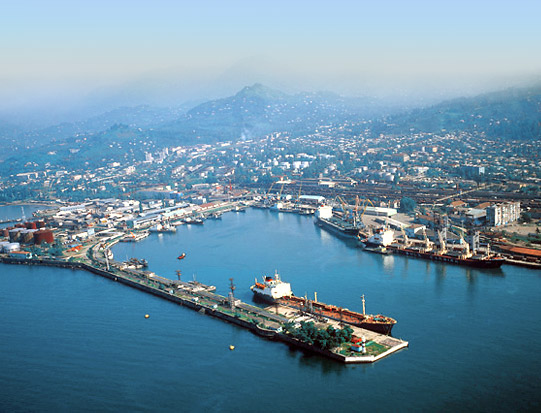 by Nestan Tsetskhladze, 5 September 2008
by Nestan Tsetskhladze, 5 September 2008 Nestan Tsetskhladze is a reporter for the Batumelebi newspaper in Ajara.
As travelers fled Ajara during hostilities with Russia, this Black Sea tourist mecca learned the cost of war.
BATUMI, Georgia Just five kilometers north of the Turkish border on the Black Sea, Gonio is one of the most popular tourist destinations in Ajara, an autonomous republic in western Georgia. But these days Gonio's beach, hotels, and cafes are deserted – as is the entire Ajaran seaside.
 In Batumi, Ajara's capital and a large port city, the only excitement recently was the 27 August arrival of U.S. Coast Guard cutter “Dallas,” which brought humanitarian aid and which was rerouted here to avoid confrontation with Russian ships patrolling the Black Sea around the main Georgian port of Poti. It motored into a Black Sea tourist hot spot that saw thousands of travelers flee as Georgia’s conflict with Russia escalated hundreds of kilometers away in South Ossetia. Around 34,000 vacationers were in Ajara before hostilities erupted 7 August in Tskhinvali, according to figures from Ajara’s Tourism Department. But most left its coastal towns in the days that followed, at a steep cost to a local tourism industry in the middle of peak season.The exodus was so extreme that some local guesthouse owners could open their rooms to refugees from the conflict zone.
In Batumi, Ajara's capital and a large port city, the only excitement recently was the 27 August arrival of U.S. Coast Guard cutter “Dallas,” which brought humanitarian aid and which was rerouted here to avoid confrontation with Russian ships patrolling the Black Sea around the main Georgian port of Poti. It motored into a Black Sea tourist hot spot that saw thousands of travelers flee as Georgia’s conflict with Russia escalated hundreds of kilometers away in South Ossetia. Around 34,000 vacationers were in Ajara before hostilities erupted 7 August in Tskhinvali, according to figures from Ajara’s Tourism Department. But most left its coastal towns in the days that followed, at a steep cost to a local tourism industry in the middle of peak season.The exodus was so extreme that some local guesthouse owners could open their rooms to refugees from the conflict zone."I had a guest from Gori," said 47-year-old Shushana Abashidze, who rents rooms to travelers in Gonio. "When the situation got complicated in South Ossetia, he left and came back with friends. I felt sorry for them and let them stay for free.”
BAD FOR BUSINESS
Tourism officials are still totaling up the financial losses, but Zurab Beridze of the Finance Ministry said the figure will approach 6 million lari, or just over $4 million. That's equal to Ajara's total tourism revenue from 2007 and more than 70 percent of this year's projected revenue.The disruption of high season, which runs until the end of September on Ajara's coast, has been a crushing blow to many small businesspeople.
Giorgi Tsereteli, co-owner of the Bungalow café in Gonio, took out a 30,000 lari bank loan to start his business this season and spent 15,000 lari on a personal watercraft.
"We intended to invite different disc jockeys from abroad, to attract tourists," he said. "When the war started, there was one Dutch DJ, and we barely managed to get him out through Turkey. Now we’re going to close down the Bungalow. We operated only four days. I have no idea how to cover the loan."
Many entrepreneurs are in the same fix, as Ajara banks have a large portfolio of tourism-related loans (none will specify a figure). Some businesses have applied to the government of the republic to extend their payment deadlines, but there are no guarantees. A spokeswoman at ProCredit Bank in Tbilisi said the bank will decide on changing its payment policy after individual discussions with debtors.
A FALSE SENSE OF SECURITY
When Russian forces started bombing Georgian military targets, Ajara, itself a former breakaway region that Georgia reasserted control over in 2004, was thought to be secure because of its proximity to Turkey, a NATO member.
"I thought that if anything happened here, I would go to the Turkish border, which is the safest place since Turkey is a NATO member country, and Russia couldn’t dare attack it," said Maia Afridonidze, 33, who left Batumi 25 August to return home to Tbilisi.
Ajara, however, was not insulated from the conflict. On 8 August Batumi Airport shut down and began evacuating staff. A day later the town was disconnected from the electrical grid. By this time as many as 2,000 workers at Batumi's port and oil terminal had fled, and many residents feared Russia would begin shelling the town that night. On 10 August Russian forces bombed Khelvachauri, a suburb of Batumi near the Turkish border, targeting a military base nearby. No one was injured.
After a request from the Ministry of Economy of Georgia, two airlines began transferring travelers stranded in Batumi to Tbilisi. Many of the people vacationing in Ajara, about half of whom were Georgian, left its capital this way.
Many foreign travelers escaped through Turkey, according to tourism officials, though crossing the border quickly became difficult as Georgian highways and rail lines were closed.
GETTING BACK TO NORMAL
Despite the lingering tension, Ajara is not in danger of losing larger tourism-related investment, including from Russia and Kazakhstan, according to the government.
"Investments don’t have a nationality," Vazha Bolkvadze, minister of finance and economy of Ajara, recently told the Batumelebi newspaper.
Indeed, after a two a two-day break, construction of new hotels in Batumi, backed by Turkish and Kazakh investors, resumed.Even local residents are feeling more secure, following the arrival of the warship USS "McFaul" in Batumi 24 August. Onlookers greeted the ship warmly, waving both Georgian and American flags.
source >>>
TOL domain names: www.tol.org, www.tol.cz, www.transitions-online.org, www.omri.cz, and www.ijt.cz.











No comments:
Post a Comment